- Home
- Anne Easter Smith
This Son of York Page 9
This Son of York Read online
Page 9
It was only later in the day, when Edward had relinquished Dickon to an escort who accompanied the younger York children back to Falstoff’s Place, they learned from their mother’s chief lady what had happened at Westminster to effect that change.
Richard of York, believing Parliament would welcome him as the savior of the realm and restorer of law and order, had dared to enter the hallowed chamber without invitation and deliberately place his hand upon the throne.
“He was wrong,” Gresilde Boyvile said, wringing her hands, “so wrong. The Lords and Commons were aghast. It seems they saw it as an intention by your father to take the crown not protect it.” She told them the archbishop of Canterbury had eventually stepped forward and asked if York sought an audience with the king.
“What did Father say?” Meg asked, fascinated.
Gresilde resorted to drama, mimicking the duke. “He shouted at them all, saying, ‘I know no man in England who ought not rather come to see me than I go to him.’ I don’t know how he dared.”
Meg gasped, George snickered, and Dickon said: “I don’t understand what that means?”
“It means Father lost his temper, and he is probably in trouble,” Meg told him, and Gresilde had bowed her head in sad acknowledgement.
The duke had then marched from the Star Chamber intent on seeing the king, virtually forcing himself into the royal apartments and sending the king to live in the queen’s chambers instead.
“Your mother defended the king bravely,” Gresilde told the children. “I know not what your father was thinking, but your mother was not about to treat that kindly, bewildered man uncivilly. Happily, the king went meekly to his new quarters on her arm—he obviously adores her, as he should,” she said, loyally.
Dickon was now thoroughly confused. Hadn’t their father told his children he had no designs on the crown? But he arrived in London with an upturned sword, went straight to the hallowed halls of Westminster and put his hand on the throne, as though he already owned it. The boy’s confusion was further exacerbated by Dame Boyvile’s next statement.
“We shall all be living in the royal apartments until your father’s castle of Baynard is restored to him,” she finished, feeling sorry for these oft-displaced children.
Dickon shook his head in exasperation. “By Christ’s nails, not another move!” he spluttered.
“Dickon!” all three onlookers exclaimed in shocked unison at the unaccustomed profanity.
Another extraordinary event in the Star Chamber took place a week later. This time Dickon was a privileged witness.
Richard of York’s rash act had had its effect after all. Several days and tense meetings later, he mollified Salisbury and Warwick, allowing the Yorkists to once again resurrect Richard’s right to the crown before the lords and lawyers. Within a week, York’s claim to the throne was finally legally recognized and a new succession drawn up: It was agreed by king, council and Parliament that Henry should wear the crown until his death when it would pass to Richard of York and his progeny.
Richard knelt and kissed Henry’s ring as the king sat on the very throne Richard had dared to touch not twenty days before. “I swear to Almighty God and all His saints that I will honor you, Henry, as my sovereign lord until the end of your days, and that I shall do nothing to hurt or diminish your reign or royal dignity, nor do anything or consent to anything that might lead to the endangerment or ending of your natural life. So help me God.”
It was the first time Dickon had seen King Henry since Ludlow. There at least, the king had looked like a soldier. Today, a thin, limp figure, with a passive face, and drab in his brown robes, he looked more like a mournful monk than a monarch. Young as he was, even Dickon could contrast the king with his magnificent subject Edward, earl of March, who now stepped forward and knelt. Ned looks like a real king, Dickon thought to himself, as his brother’s strong voice echoed in the chamber while giving his pledge. It was odd he had not thought the same of his father.
Henry ratified the agreement in a soft monotone—not like a king at all, disillusioned Dickon thought. To Dickon the king seemed as dejected as the boy often felt when rebuffed by George or ignored by his father. Although he could not appreciate the ignominious position Henry had been put in, and how it was to the king’s credit that his voice held no malice or bitterness as he disinherited his own son, Dickon felt sorry for him.
“I, Henry, by the grace of God, king of England and France and Lord of Ireland, do recognize the claim to the throne of Richard, duke of York and his heirs, which shall be theirs at the time of my death and not before.” He looked up from the written statement, his sad eyes sweeping the chamber and coming to rest on the small boy sitting in the gallery next to his mother, the king’s friend and sometimes champion. The boy and the king locked gazes for a second, and Dickon, moved by the king’s focus on him, placed his hand upon his heart. I am loyal to you, my sovereign lord, the instinctive gesture seemed to say. A glimmer of a smile lit the king’s face before he returned to his paper and continued to read:
“I charge all persons here to put it abroad that it shall be considered an act of high treason for any person to conspire against the said duke’s life. And now, my lords, you must swear to uphold this agreement and all its particulars with the duke, as he must now swear to defend you from those who would object to it. Do you swear?”
With one voice the lords cried: “Aye, we swear.” And Dickon, gripped by the stirring moment, could not help but join in with his own, “I swear!” much to his mother’s amusement.
Richard, duke of York, was now rightful heir to the throne of England.
How easily men’s loyalties wavered in those turbulent times, and Dickon was learning how an oath could be broken as well as made. He was now thoroughly unsettled. To whom was he to be loyal? The king or his father who, it was now said, should be king?
True, an oath had been sworn by the king, but it did not mean the fight for power was over, as the duke would soon discover.
Dickon saw Edmund mount the stairs to the roof of Baynard’s one chilly morning, and wrapping his coney-lined cloak about him, Dickon hurried up the spiral staircase to join him. He liked this big, handsome brother with the gentle demeanor. Having spent those many months in exile with their father in Ireland, Edmund would surely settle the question of loyalty that had been gnawing at the befuddled young boy.
Despite the intrusion, Edmund’s blue eyes twinkled as he gave Dickon a warm smile.
“Do you have time for me, Edmund?” Dickon asked and, after Edmund’s nod of encouragement, he admitted: “I am so muddled up. Please can you help me understand why King Henry would give up his crown to Father when Father has said over and over he doesn’t want to be king? And then one day Father is proclaiming himself king and the next minute he is back to swearing an oath to be loyal to Henry.”
“I confess ’tis bewildering, Dickon. In truth, I had to come up here to ponder the puzzle myself. Perhaps it is not about wanting to be king but about wanting what is right for England. Father’s Yorkist claim to the throne is better than Henry’s Lancastrian one, but until Henry’s many weaknesses endangered England, Father was content to serve at Henry’s right hand. Perhaps that is what all this is about: his loyalty and duty to England.”
“I hope you’re right.” Dickon nodded thoughtfully. “But he won’t just snatch the crown away will he? King Henry is a good man—Father said so.”
Edmund had to be honest with the boy. “I don’t think he will, Dickon, but it worries me that he might. Father has always been loyal to the king, as we know. We have to trust Father, do you see?” He hoped he had answered some of the boy’s questions, even if he had not answered many of his own.
“But how can Father be loyal to the king and claim to be king at the same time,” Dickon persisted. “It does not make sense. I want to be loyal to the king and to father, but how?”
The earnest upturned face made Edmund smile. He reached down, picked up the boy and sat him
in a crenel of the castle wall. “Always thinking, are you not, little brother? Nothing wrong with that, but for now I think we must just wait and see. Above all we must trust Father, and you do trust him, don’t you?”
Dickon nodded vigorously. “Aye, I do.” He looked up into the wintry sky as though searching for an answer from the heavens. “It’s like trusting in God or believing in the Holy Spirit. To be honest, I am not sure about the Holy Spirit either, but Father Lessey has taught me to have faith in God and what I cannot understand. Father’s real, so in truth it’s easier to have faith in him, isn’t it?”
Edmund hugged his brother warmly. “By all means believe, Dickon; it will help ease your mind.”
Before vacating the royal apartments to return to Baynard’s Castle, the family was joined by Cecily’s brother one day after the noonday meal. Cecily and Richard were flanked by five of their seven children. As they all turned towards him, Salisbury thought he had stumbled into a painting. He was struck by the physical beauty of each one of them, and how impressive they were as a family. A royal family as it should be, he thought.
Cecily rose and held out her hands to him. “Welcome, dear brother. Come, take some wine with us. Dickon, give your uncle your seat.” She was relieved to see no signs of worry on his lined face for a change. The frayed nerves of October had given way to a more tranquil November, allowing her and Richard to rekindle the passion of their youth in the days after the historic succession announcement and the restoration of their estates. It showed on her face, and Salisbury thought he had never seen his striking sister more beautiful.
“God’s greeting, Uncle,” Dickon said, effecting a graceful bow. “I pray you, take my seat,” and he indicated the empty place on the bench. Dickon liked his Uncle Salisbury; certes, he was an old man to the child, but he had a kind face under his bushy beard, and he always had a sweetmeat or two to bring the children. In truth, the sixty-year-old earl was feeling his age and tiring of endless conflict. He was happy to relinquish power to his ambitious, capable son, Warwick.
“Is all well at the Erber?” Cecily asked, “or is this merely a social visit?”
“The latter, Cis.” He turned to York. “I was dining with John Wenlock and heard an intriguing story that I simply had to regale you with.”
“Please tell me that Margaret of Anjou drowned on her way to Scotland,” York said, wryly. “I fear we shall not rest until she has expired. Word came that she had left Harlech.”
“Nay, I know nothing more, except that Northumberland has been making mischief for us on the border, which is a little too close to the queen for comfort. If they join forces…”
“…’tis unlikely, brother. Now what is your tale?”
“It seems that as the Commons sat in the abbey’s refectory arguing about the legality of your claim, the chandelier that is shaped like a crown loosed its chain and fell with an almighty crash in the middle of the floor, those present leaping aside to avoid it.”
The God-fearing York family all crossed themselves in unison, and Dickon muttered: “…’s nails!” which earned him a frown from his mother.
“‘A portent for the house of Lancaster perhaps’ one man had whispered, and a good omen for us,” Salisbury concluded.
“Extraordinary!” York exclaimed.
“Poor Henry,” Cecily said, feeling genuinely sorry for the innocent king.
When the talk turned to politics and armies, Dickon got bored. “George, I am going exploring,” he whispered. “Will you come?”
George, for once paying attention to his elders, snapped, “Go and play by yourself.”
Cecily, sensing her youngest’s restlessness, gave an imperceptible nod toward the door and smiled at her son. There were times he was grateful to be small enough to slip easily from a room unnoticed.
He wandered down one of the long corridors that led away from the royal apartments, and the guards he encountered at strategic points grinned at him. “Having a look round, young ’un?” one said. “That way goes to the queen’s chapel. ’Tis a wonder to behold, I have heard.”
Arriving at a door that was more ornate than the others, the young York prince tried not to look lost. Two more burly guards with halberds stood to attention and bowed their heads.
“Can I go in?” Dickon asked timidly. “Your friend back there said it is ‘a wonder.’”
The two men glanced at each other, their York livery making them more disposed to granting the young lord’s request. “He be in there a long time,” one of them said. “Could be ’e be done ’is interminable praying and has gone back to ’is chamber by the side door.”
“Too true,” his comrade grumbled. “And we get stuck out ’ere for hours when ’e’s never even in there. ’Ere, take a peak and tell us if ’e be gone, there’s a good lad.” He gentled the latch open and pushed the heavy door ajar.
Dickon sidled in and saw instantly to whom the men were referring. “The king,” he squeaked, and was about to turn and flee when Henry turned round from his cushion by the altar rail and spied him. It was too late to run, and the guards had hurriedly closed the door for fear of a reprimand. Much to Dickon’s relief the king rose, smiling.
“Come here, young man. ’Tis Lord Richard, York’s son, is it not?” he asked, a warmth in his voice not heard on that day in the Star Chamber. Dickon managed a low bow, then went on his knees before his king.
Henry shook his head sadly. “I remember you from Ludlow. Such a terrible day, and you saw such horror that no child should have to see. I pitied you and your brother and sister, although your mother showed extreme courage.” Then he wagged his finger, “Ah! And now, I recall seeing you in the gallery at Westminster…” but his eyes clouded as he thought back to the Act of Accord, and his next comment was almost inaudible, “…on that dreadful day.”
Dickon peeked up at the king who was staring down at him absently. The warm brown eyes reassured Dickon and he felt it safe to speak. “Aye, I was there, Your Grace, and I, too, swore my allegiance. If it please you, I am Richard Plantagenet. But my friends call me Dickon.”
The lad’s naturalness disarmed Henry, whose long face broke into a weary smile. “Well then, Dickon, if you are my loyal subject, come and keep me company. My conversations with our Maker are rather one-sided, although they do give me comfort.” He sat in a pew and patted the seat next to him. “I hope you say your prayers each night.”
Dickon hopped up and sat companionably beside the king. “Oh, aye, Your Grace. Every night. Mother would be very cross if I didn’t.” But then, not receiving a reply, Dickon lapsed into silence.
Henry noticed a likeness between father and this son that he found oddly reassuring. The hulking Edward of March had none of his father’s fine features, but there were mannerisms that Henry recognized as York’s. Henry was a little afraid of Edward, even though the eighteen-year-old had shown him nothing but respect in their rare meetings, perhaps because the young earl seemed to possess all the kingly attributes he himself was lacking: charisma; a striking physique; Plantagenet soldierly skill; brash confidence; and the ability, even at so young an age, to draw men to him. In one of his breaks with reality, Henry had clearly seen a vision of Edward wearing the coronation robes and being acclaimed by cries of “God save the king.” He had never forgotten it.
“Do you think your brother will make a good king?” The question seemed to Dickon to come from nowhere, but to Henry it was perfectly logical, although he forgot he was speaking to a child.
“Ned?” Dickon queried, puzzled. “He is the best brother in the world—and the best soldier, after Father that is,” he said, remembering to be loyal. “I think you mean Father, Your Grace, because Ned won’t be king, will he? You have to die first and then Father will take your place. I know Father would be a good king,” he hesitated, “but do you?”
Henry was astonished. The boy was certainly no clotpole and he deserved an answer. “Aye, I believe York would make a good one,” he admitted reluctantly. If the tr
uth be told, Henry wished he had never awakened from the bout with madness five years earlier that had left the government no choice but to ask Richard of York to be protector. Richard had accomplished the task well, Henry had later learned, but York never had a chance to prove his worth with Henry, for once Henry’s sanity had returned, the duke had been immediately ousted by the queen and her sycophant counselors. Henry had no personal quarrel with York, but he could not deny his wife’s fear or hatred of the man, and so the duke became their enemy.
As was this child, he thought sadly, observing the small innocent boy sitting with him. The saintly Henry could not help but cross himself as he thought, Dear God, what kind of world is it we live in where even a child is an enemy?
“Always be glad you are the fourth son, Dickon,” Henry suddenly said. “It means you need never be king.” Then his eyes moistened, and he said more gently, “’Tis a curse and a responsibility that is too heavy for one man. I am no God, although sometimes I must act as though I am.” He shuddered. He thought of all the deaths he had caused, whether in battle or on the scaffold, and was certain he was destined for hell.
“What I mean to say is I have much to answer for as king, and it troubles me every minute of every day. ’Tis why I am here on my knees so much, praying for forgiveness from God.”
Dickon heard the deep sorrow and remorse in Henry’s voice, and, young as he was, he was greatly moved. Then when he saw tears in the king’s eyes, his sympathetic heart wanted to comfort Henry but he dared not reach out to touch the long delicate fingers. They sat in silence for a few moments both contemplating the responsibilities of kingship.
Henry gave a long sigh. “Forsooth and forsooth,” he went on, using his favorite expression, “how I wish I had not been born a king.”
“Father always said that too—that he never wanted to be king. And neither do I,” Richard declared. “It just does not seem to bring happiness, in truth, only trouble.”

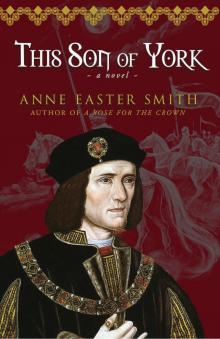 This Son of York
This Son of York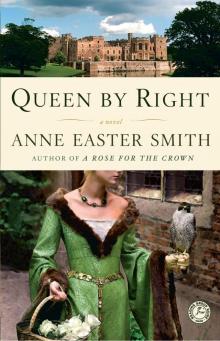 Queen By Right
Queen By Right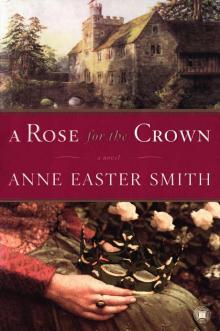 A Rose for the Crown: A Novel
A Rose for the Crown: A Novel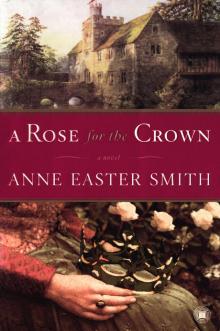 A Rose for the Crown
A Rose for the Crown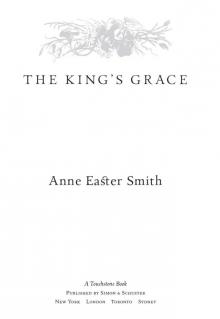 The King's Grace
The King's Grace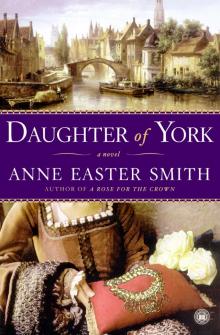 Daughter of York
Daughter of York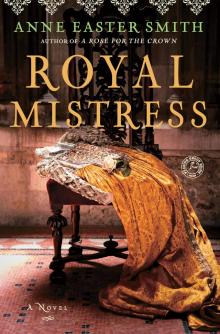 Royal Mistress
Royal Mistress